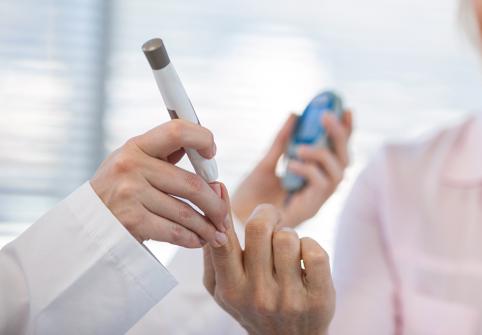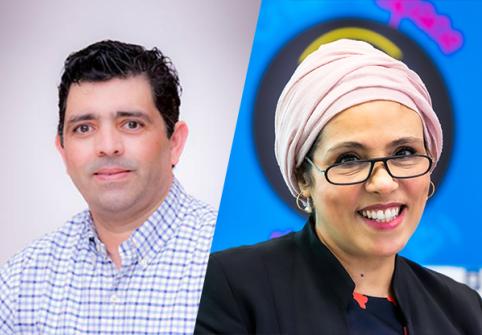Excellence Cancer, Diabetes and COVID-19: The View from QBRI
By Dr. Paul J Thornalley, Dr. Julie Decock, Dr. Nehad Alajez, and Dr. Mariam Al-Muftah
COVID-19 viral infections surfaced in the first three months of this year and have produced a major challenge for public health and healthcare services. Measures taken by the Ministry of Public Health (MoPH) to keep people safe in Qatar are exemplary and have been praised by the World Health Organization (WHO). Below we describe why extra care is required for patients with existing health problems – diabetes and cancer.
What We Know About COVID-19 Disease
COVID-19 is caused by infection with SARS-CoV-2, a coronavirus with a single strand of ribonucleic acid (RNA) genome wrapped in a small membrane particle. The virus is usually inhaled in droplets and reaches the surface of cells lining the small air passages of the lung. The virus binds and enters cells in the lung, evading the body’s defense to effectively counter it. Inflammation, fever and often a dry cough develop. Decline in normal lung function is the major threat to patient’s health and the reason why hospital care is required for severe cases.
COVID-19 and Diabetes
When people with diabetes develop a viral infection, it may be challenging because it can produce changes in blood glucose levels and affect management of related complications. The immune system is weakened in diabetes, making it harder to fight the virus and requiring a longer recovery period. Indeed, the latest evidence suggests that patients with diabetes do not have an increased risk of developing COVID-19 compared to people without the condition.
However, if patients with diabetes do become infected with COVID-19, they need timely and more intensive support from their professional healthcare team to fight off the effects and make a full recovery. The best thing to do is to follow MoPH guidance on how to avoid the virus if possible. If infection develops, patients with diabetes may need extra consultation with their professional healthcare support team (community doctor and nurse), increased attention to blood glucose, fluid intake, body temperature and extra rest to recover.
There has been concern of an increasing number of patients cancelling their routine visits to diabetes clinics during the pandemic. This is contrary to how patients with diabetes can best manage the challenges faced by possible infection. So, patients are encouraged to keep appointments and regular consultation with their healthcare support team.
Patients with type 1 or type 2 diabetes are often treated with angiotensin converting enzyme inhibitors (ACE inhibitors) and angiotensin II receptor blockers (ARBs) to control blood pressure and maintain kidney function. A related protein, ACE2, is often increased in response to these drug treatments. The coronavirus binds ACE2 and enters cells. There is no evidence that ACE inhibitor and ARB drug treatment increases the risk of contracting COVID-19 for patients with diabetes. In fact, increased ACE2 is usually beneficial for lowering blood pressure and also maintaining lung function.
With adequate precautions, increased attention for glucose control and seeking professional healthcare support as required, patients with diabetes can get through this testing time.
COVID-19 and Cancer
Patients with cancer are considered a vulnerable group at higher risk of severe illness from COVID-19 infection as a result of their weakened immune system. COVID-19 causes a viral infection that primarily affects the lungs and in most healthy people will be cleared by the immune system without the need for medical intervention. Our immune system is a powerful natural mechanism that protects our bodies from foreign invaders such as viruses and bacteria, and carries out regular checks to eliminate abnormal cells. Spontaneous changes occur in our cells regularly, which can give rise to cancer. A healthy immune system is nevertheless capable of detecting altered cells and eliminates them before they give rise to tumors.
It is now widely accepted that tumors use different strategies to escape detection or to inhibit the immune system. In addition, chemo- and radiotherapy can further weaken the immune response as these treatments affect various cells in the body, including the immune cells. As a result of a weakened immune response, cancer patients will likely experience more difficulty fighting the virus, and are at risk of developing more serious symptoms that might ultimately prove fatal. In fact, recent data released by the WHO-China Joint Mission on COVID-19 highlighted the highest death rate in patients over 80 years old. From a disease-point of view, the death rate from COVID-19 in patients with cancer was ranked fifth after cardiovascular disease, diabetes, hypertension and chronic respiratory disease.
Worldwide, the scientific community has spent a substantial amount of effort over the past decades gaining insight into how the immune system functions in cancer patients. At Qatar Biomedical Research Institute (QBRI), part of the Hamad Bin Khalifa University (HBKU), we aim to better understand the molecular mechanisms of cancer with a special focus on patients in Qatar and the wider region. Doing so will help us to identify changes that occur in the immune response of patients and explore ways to correct changes that have a negative impact on our body’s ability to fight cancer.
Today, healthcare providers also have the difficult job considering the potential risk of COVID-19 infection in addition to the tumor itself when determining the medical needs of each individual cancer patient. Fortunately, cancer patients and their family members can prevent exposure to the virus and its potential complications by adhering to international guidelines on what to do to stay safe.
Coming Together to Fight COVID-19
Finally, the healthcare and scientific research community have joined forces worldwide and are making great strides in understanding COVID-19, developing drugs and a vaccine against the SARS-2-CoV-2 virus. The global implementation of precautionary health and safety measures - together with major efforts in the health and life sciences field - cultivate an optimistic outlook that we can control the COVID-19 pandemic and are working towards having treatments available at the earliest.
Closer to home, a QBRI group of researchers are planning to cooperate with different stakeholders to conduct research projects focusing on COVID-19. In addition, a number of scientific publications on the same subject will be published in the not-too-distant future.
QBRI has also provided Hamad Medical Corporation (HMC) with a sophisticated Hamilton robot that speeds up the process of extracting RNA from the virus. This has provided a greater opportunity to analyze more samples, which in turn affects the diagnostic speed and treatment of coronavirus cases.
QBRI is also working on developing a novel coronavirus diagnostic method in order to make it available to HMC as a backup plan in case of need.
In addition to the above, QBRI also provided HMC with a list of researchers with the necessary expertise to voluntarily support and work in its diagnostic laboratories. Finally, a number of QBRI researchers are currently working on producing regular reports to inform the community of the latest updates, and to reduce the spread of any false or unaccredited information about coronavirus.
Dr. Paul J Thornalley is Director of the Diabetes Research Center at Qatar Biomedical Research Institute (QBRI); Dr. Julie Decock is a scientist at QBRI’s Cancer Research Center; Dr. Nehad Alajez is a senior scientist at QBRI’s Cancer Research Center; and Dr. Mariam Al-Muftah is a scientist at QBRI’s Cancer Research Center.




